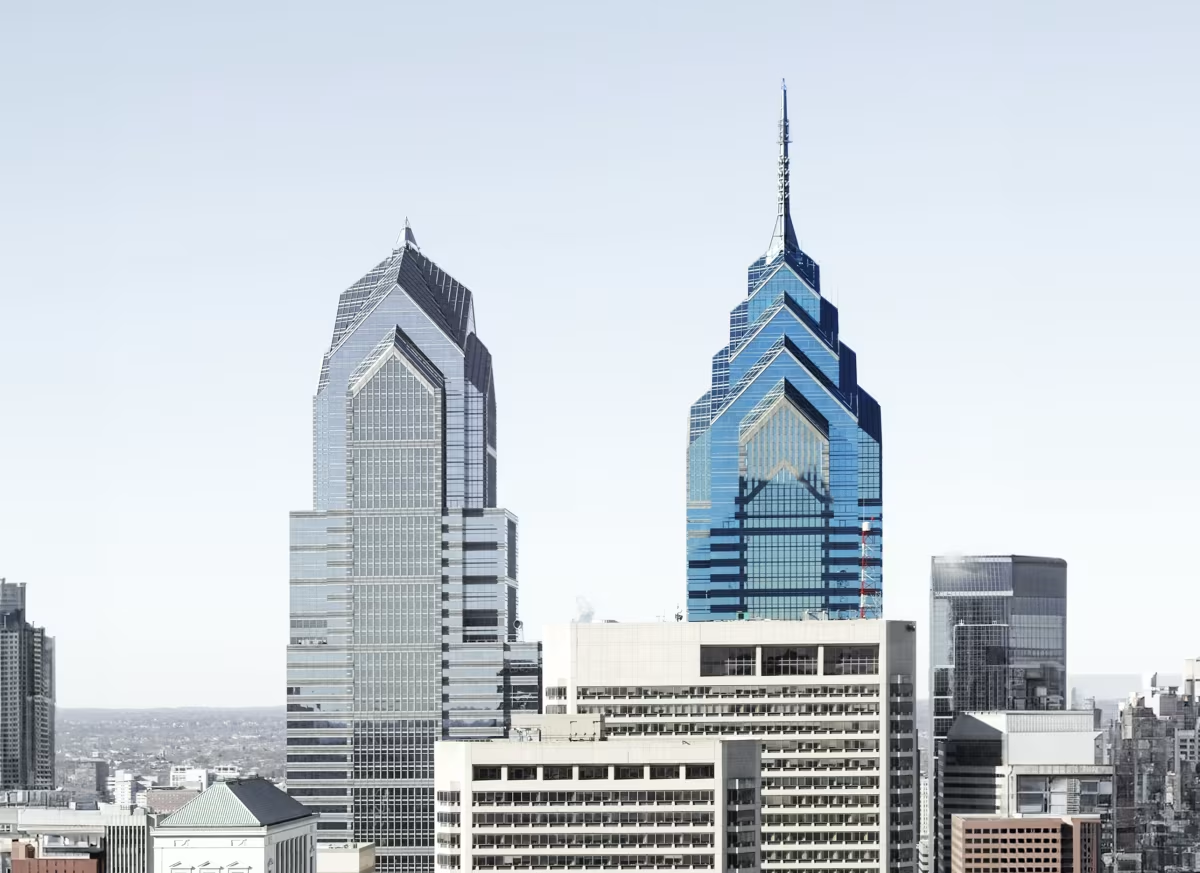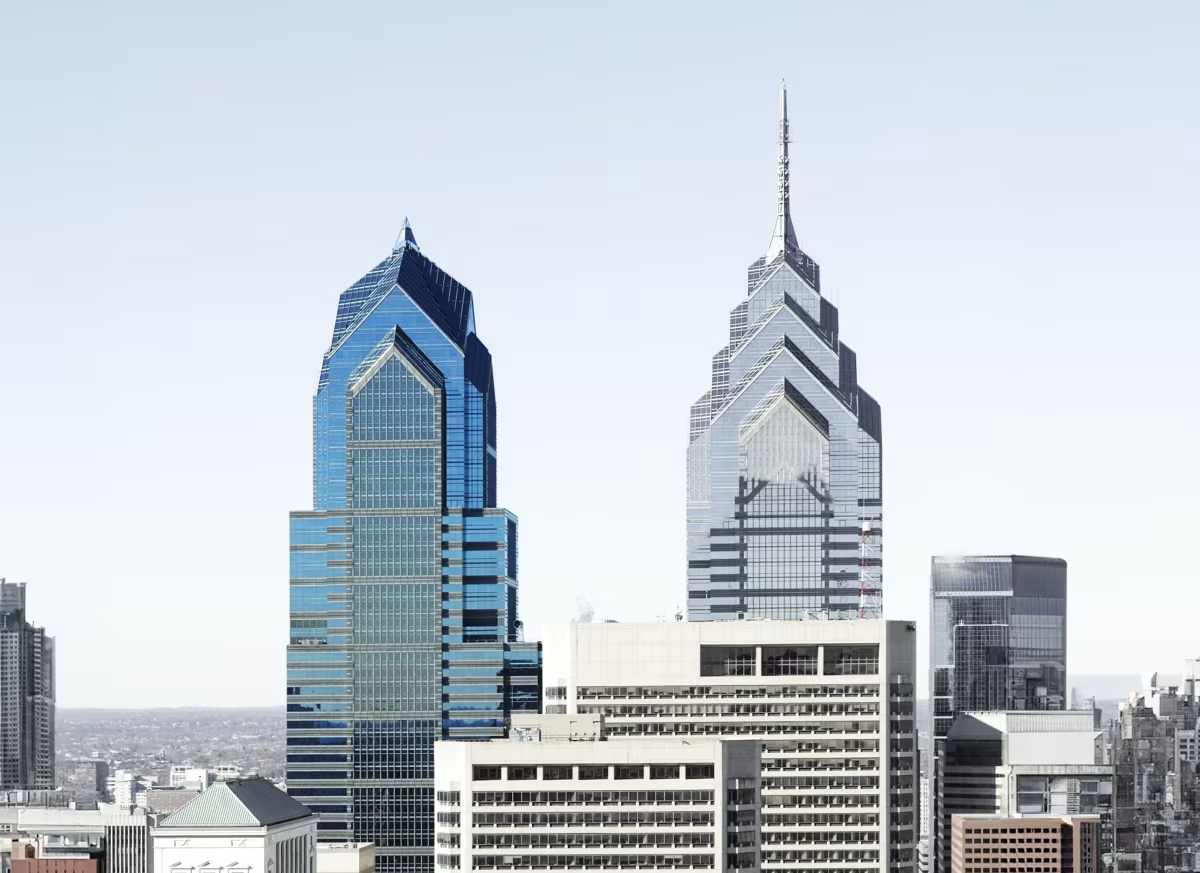One Liberty Place Building vs Two Liberty Place Building


Comparing the One Liberty Place Building and the Two Liberty Place Building is especially interesting because they share much in common. Both rise in Philadelphia, PA both were designed by Murphy/Jahn Architects, and they were completed within 3 years of each other.
This overlap gives us a unique opportunity to understand how Murphy/Jahn Architects approached different commissions in the same urban context and historical context during a short period.
Height & Size
These two towers present an interesting contrast in their proportions. The Two Liberty Place Building rises higher at 846ft (258m), while the One Liberty Place Building reaches 0ft (m). However, the One Liberty Place Building accommodates more floors with 61 levels above ground, compared to 58 floors in the Two Liberty Place Building.
This suggests different approaches to interior space design. The Two Liberty Place Building has an average floor-to-floor height of approximately 4.4m, while the One Liberty Place Building has more compact floors averaging around 0m each. The taller building's more generous floor heights might indicate grander interior spaces, higher ceilings, or different programmatic requirements.
These different proportions likely reflect the specific needs each building was designed to serve, whether driven by zoning regulations, client requirements, or the intended use of the spaces within. The contrast shows how architects can achieve different spatial experiences even when working with similar overall building scales.
Architectural Style
Both the One Liberty Place Building and the Two Liberty Place Building were designed in line with the aesthetic conventions of the Postmodernism style.
At the time, this style was at the height of its popularity. So Murphy/Jahn Architects followed what was in many ways expected at the time, producing designs that fit comfortably within contemporary architectural norms rather, than breaking with convention.
Uses
The Two Liberty Place Building follows a mixed-use model, combining residential. In contrast, the One Liberty Place Building has remained primarily commercial.
Originally, the Two Liberty Place Building was designed for commercial, but over time it was converted to mixed. The One Liberty Place Building by contrast has maintained its original role.
The Two Liberty Place Building offers 113 residential units.
Both towers provide significant parking capacity, with One Liberty Place Building offering 779 spaces and the Two Liberty Place Building offering 750.
Structure & Facade
Both the One Liberty Place Building and the Two Liberty Place Building rely on a Framed Tube In Tube structural system.
A tube-in-tube system combines a reinforced central core with a perimeter of columns connected by floor slabs. This arrangement creates a stiff structure that resists both vertical and lateral forces efficiently.
They also employ the same type of facade, a Curtain Wall facade.
A curtain wall is a non-load-bearing facade hung from the structural frame. It is anchored to floor slabs and transfers only its own weight and wind loads, allowing for sleek, glassy exteriors.
| One Liberty Place Building | Two Liberty Place Building | |
|---|---|---|
| Murphy/Jahn Architects | Architect | Murphy/Jahn Architects |
| 1985 | Construction Started | 1988 |
| 1987 | Year Completed | 1990 |
| Postmodernism | Architectural Style | Postmodernism |
| Commercial | Current Use | Mixed |
| 61 | Floors Above Ground | 58 |
| 111,483 m² | Usable Area (m²) | 110,000 m² |
| 26 | Number of Elevators | 23 |
| Framed Tube In Tube | Structure Type | Framed Tube In Tube |
| Steel | Vertical Structure Material | Steel |
| Concrete | Horizontal Structure Material | Concrete |
| No | Facade Structural? | No |
| Glass, Steel | Main Facade Material | Glass, Steel, Granite |
| Rouse And Associates | Developer | Rouse & Associates |
| Lev Zetlin Associates | Structural Engineer | Thornton Tomasetti |
| PA | State | PA |
| Philadelphia | City | Philadelphia |
| 1650 Market Street | Address | 1601 Chestnut Street |